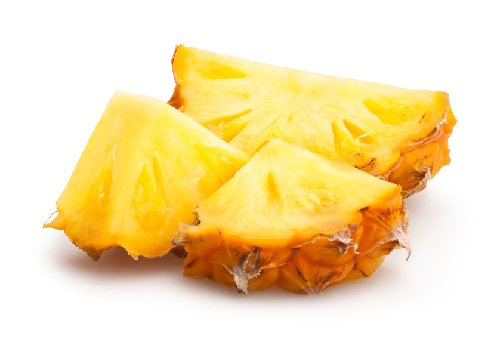 Pineapples are delicious as well as nutritious!Some studies show that eating pineapples can be an effective home remedy to fighting sinusitis.
Pineapples are delicious as well as nutritious!Some studies show that eating pineapples can be an effective home remedy to fighting sinusitis.
A juicy, ripe pineapple can satisfy that sweet craving you get midday better than any chocolate bar can.
But the health benefits of pineapples are far more extensive than people may realize.
Pineapple Nutrition Chart
Just one cup (165 grams) of raw pineapple contains the following:
| Nutrient | Amount | Daily Value |
| Vitamin C | 78.9mg | 131% |
| Thiamin | 0.1g | 9% |
| Folate | 29.7mcg | 7% |
| Calories | 137 | 7% |
| Carbohydrates | 22g | 7% |
| Magnesium | 19.8mg | 5% |
| Potassium | 180mg | 5% |
| Niacin | 0.8mg | 4% |
| Pantothenic Acid | 0.4mg | 4% |
| Iron | 0.5mg | 3% |
| Calcium | 21.5mg | 2% |
| Phosphorus | 13.2mg | 1% |
| Vitamin K | 1.6mcg | 1% |
| Zinc | 0.2mg | 1% |
| Sodium | 2mg | 0% |
| Saturated Fat | 0g | 0% |
| Trans Fat | 0g | 0% |
Health and Nutritional Benefits of Pineapples
So, what are the nutritional benefits of pineapples? Here are some of the most significant:
- Pineapples contain a significant amount of calcium, potassium and vitamin C.
- Pineapples are low in fat and cholesterol.
- Pineapples are rich in calcium and magnesium.
- Eating pineapples could help in the growth of bones in young people and strengthen bones in older people.
- Eating pineapples can help treat coughs and colds.
- Bromelain, an enzyme found in pineapple, can help loosen mucus and treat sinus congestion.
Some studies show that eating pineapples can be an effective home remedy to fighting sinusitis. It is a natural supplement that can reduce inflammation throughout the nasal passage.
Also Read: Sinus Pressure Points to Relieve Sinus Pain
Studies Show That Bromelain Can Help Cure Sinusitis
In one clinical trial performed at the Institute of Clinical Immunology and Transfusion Medicine in Leipzig, Germany, bromelain was used to treat patients suffering from acute sinusitis. Children under the age of 11 who were diagnosed with acute sinusitis were recruited for the trial. Data from 116 patients from 19 centers across Germany were analyzed in the cohort study. Patients were either treated with bromelain or with standard therapy.
The research team then measured the effectiveness of the different treatment groups by recording the duration of symptoms. Patients in the bromelain therapy group recovered faster from symptoms compared to the other treatment groups. Researchers concluded that the use of proteolytic enzymes, such as bromelain, could benefit patients with sinusitis.
Eating pineapples can do more than treat colds and battle sinus infections. Pineapples are also known to prevent blood clots and help ease morning sickness. Pineapples have also been used as treatment for arthritis and joint pain—primarily because bromelain acts as an effective anti-inflammatory when treating pain.
Balance Your Daily Diet With Pineapples!
Quick fix diets are not recommended for anyone hoping to be healthy in the long term, so pineapples can be included as part of your everyday eating regime:
- Try eating one slice of pineapple three times a day— for breakfast, lunch, and dinner
- Add pineapples to smoothies
- Eat the pineapples fresh or canned (choose low sugar selections)
- Grill pineapples for a simple and fast snack
- Chop fresh pineapples and portion out daily servings
- Add pineapples to yogurt
- Blend pineapples with cottage cheese
Don’t be afraid to be creative with pineapples. Because they are sweet, they can go well with many foods, including chicken and pork.
Read Next:
- Pears Can Lower Your Risk of Obesity (And 5 Other Health Benefits!)
- Banana Peels Can Treat Acne and More!
Sources for Today’s Article:
Kessler, M., “Home Remedies for Sinus Infections,” Doctors Health Press web site, August 28, 2015; https://www.doctorshealthpress.com/pain-articles/sinus-infection-home-remedies.
Wolf, I., “Is Fresh Pineapple Good for the Sinuses,” Livestrong.com, October 22, 2015; http://www.livestrong.com/article/530437-is-fresh-pineapple-good-for-the-sinuses/.
